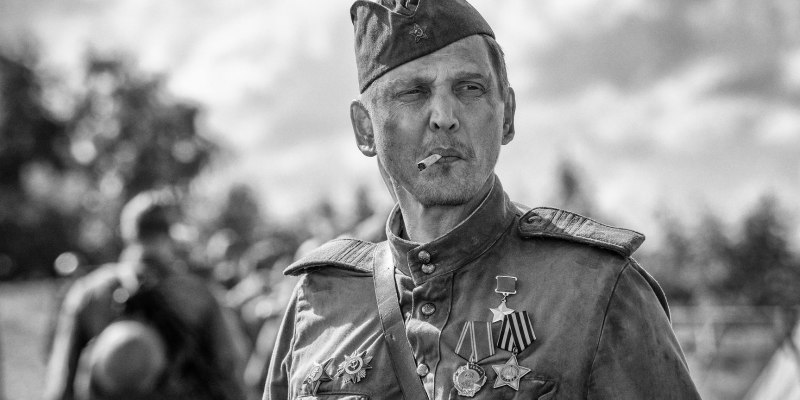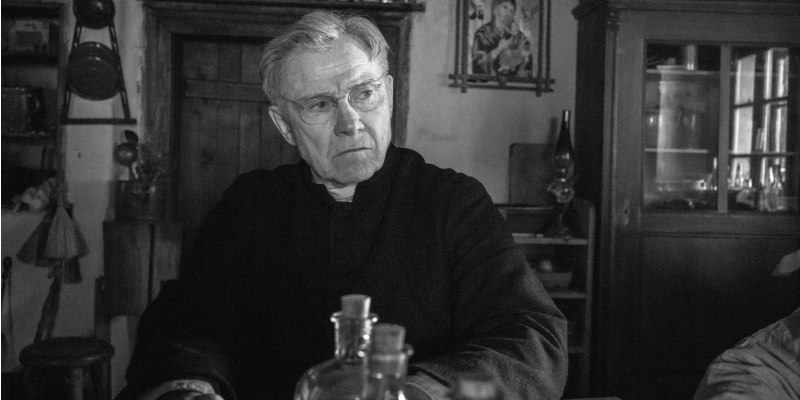
In WWII-ravaged Europe, a young Jewish boy witnesses and is subjected to
a series of acts of brutality.
Review by
Benjamin Poole
Directed by: Vaclav Marhoul
Starring: Petr Kotlár, Udo Kier, Stellan Skarsgård, Harvey
Keitel, Julian Sands, Barry Pepper

Ok.
Here goes.
Let’s start with a spoiler warning. From my point of view, it’s easier to
discuss my various issues with Václav Marhoul’s adaptation of
Jerzy Kosiński’s infamous novel The Painted Bird, a period piece set in Eastern Europe during the Second World War, via
making specific references to the extremities it depicts. Secondly, due to
the severe content of the film I feel it’s a moral duty to warn the more
sensitive of what goes on in this hyperbolic, ridiculous movie in case of
any potential triggering.
The narrative follows a little Jewish boy (Petr Kotlár - amazing) of around 12 years old as he seeks refuge among the starving, pastoral wastelands of middle Europe, meeting stranger and increasingly unpleasant characters as he goes about his desperate search for humanity. The boy (we only discover what he is actually called at the end, so I at least won’t spoil that by naming him here) witnesses the following: prostitution, incest, a sex worker being beaten to death, a man having his eyeballs scooped out with a spoon, cats shagging, a mother and baby being shot, a girl fucking a goat, more people beaten; again, some to death. His own experiences include: sexual abuse from an older man, sexual abuse from an older girl, beatings, being thrown in a hole full of human excrement, his pet being burnt alive in front of him, more beatings, getting buried up to his neck so some prick birds can peck at his head. Towards the end he only gets a brutal caning from someone and it honestly seems like a relief.

The narrative follows a little Jewish boy (Petr Kotlár - amazing) of around 12 years old as he seeks refuge among the starving, pastoral wastelands of middle Europe, meeting stranger and increasingly unpleasant characters as he goes about his desperate search for humanity. The boy (we only discover what he is actually called at the end, so I at least won’t spoil that by naming him here) witnesses the following: prostitution, incest, a sex worker being beaten to death, a man having his eyeballs scooped out with a spoon, cats shagging, a mother and baby being shot, a girl fucking a goat, more people beaten; again, some to death. His own experiences include: sexual abuse from an older man, sexual abuse from an older girl, beatings, being thrown in a hole full of human excrement, his pet being burnt alive in front of him, more beatings, getting buried up to his neck so some prick birds can peck at his head. Towards the end he only gets a brutal caning from someone and it honestly seems like a relief.

I mentioned to one of my pals that I would be reviewing this adaptation and she balked, saying it was one of the only books she had ever had to put down (she’s no shrinking violet, either - as a hunt saboteur and animal rights activist, she has mettle). And so, throughout the film, I was steeled for the moment when I would have to pause or hide behind a cushion (in contrast to my mate, I have no mettle, and cry like a ween at films). However (apart from during the opening sequence, which is an authentically sad scene of animal cruelty), it never happened. I mean, there was atrocity piled upon atrocity, but the cumulative dynamic of the brutality, the relentless sense of one scene having to one up the previous in terms of perversity and violence, simply made the film a predictably grim experience and thus far beyond anything with true potential to shock.
[ READ MORE: New Release Review - The Exception ]
Divided into chapters with title cards bearing the names of whoever is about to eke out some more abuse on our lad, you view just waiting for whatever ill fortune is inevitably going to befall him. Oh, he’s fallen into a vat of shit. Now he’s murdered his abuser by dropping him into a pit of starving rats like something out of Saw (this particular abuser is played by the great Julian Sands, who looks a lot like Blakey from On the Buses in his flat cap, which does somewhat dampen the intensity of his performance). The approach is not numbing, just dull.

Marhoul’s dark picaresque is similar to De Sade’s Juliette/Justine diptych, with the wandering European protagonist encountering increasingly bizarre rogues with bespoke perversions. Thing is with De Sade, though, is that his extremities are couched within a context of satire, a twisted philosophy explored through dark absurdity (you know, like the cartoon horrors of Salò). The Painted Bird, with its framework of IRL barbarism - anti-Semitism, the Nazis - has none of this objective nous, and instead, with its lachrymose score and focussed humiliation of its central character, aims for a kind of comforting sentimentality that in its disingenuity seems more offensive than any of the misery seen on-screen.
Upon publication, Kosiński, like some formative James Frey, put it about that the incidents in his novel were autobiographical: a claim that Kosiński, according to Wikipedia, eventually ‘quietly refrained from’ (haha!) as it turned out he was a fraud. The events of Nazi occupied Europe are dangerous truths to play with. Along with the moral question of exploiting real world suffering, there is also the aesthetic issue of how the material is presented. If there is a maxim at work in The Painted Bird concerning man’s inhumanity to man (because, otherwise, what would be the point?), then the tableaud sequences and their repetitive nihilism only serves to ultimately distance us from any potential themes or ideas.
[ READ MORE: New Release Review - Imperial Blue ]
Although the cinematography is gorgeous in its depiction of the vast, empty forests and fields of Europe, rendering the landscape as lushly haunting as the setting of a Grimm Kinder-und Hausmärchen, the blocking of certain scenes are just, well, silly. Take the bit where a teen girl turns out to be one of those zoophiles you have these days and goes and does it with a goat, for instance. Generously, I presume that the filmmakers could not make it look too realistic due to matters of taste and possible regulatory factors. So, what you have is some poor kid doing upside down press ups - with a (thankfully) completely clear lack of contact - beneath a completely disinterested looking buck. Something which should to all intents and purposes look utterly disturbing instead seems udderly ludicrous…

In The Painted Bird, almost everyone involved is a git; an utter twat who lives to enact their limited powers upon those weaker than them; a social dynamic which, eventually, even infects our hero. Is this a comment upon behaviour during war time? The pervading nihilism of the film gives the impression that, even without the conflict going on, the villains of the narrative would be getting up to their filthy tricks as normal (I’m not sure that the advance of the Red Army would turn people to father/daughter incest, for example). Also, it’s usually the poor people who are doing this sort of thing: you know, the people who had no say in declaring war whatsoever.
I can see art centre edge-lords lapping this sort of schtick up, but while the backdrop of the Second World War may trick certain audiences into believing that The Painted Bird has gravitas, within the ghastly flamboyance of this film, we're ultimately given a safe distance from it because it is impossible to take the film seriously. Perhaps the film’s biggest crime is how glibly it renders the social outcomes of the biggest war ever. With its deceitful conflation of actual horror and imaginative torments, in The Painted Bird actual historical suffering is made into just another dull story.

The Painted Bird is on MUBI UK now.
